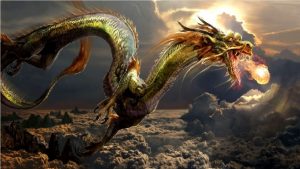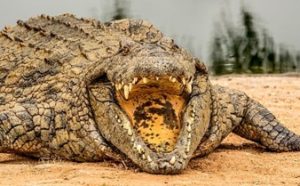On The Presence of Dragons in The Hebrew Bible
Note: this entry in my blog is a midrash, that is to say, a textual commentary on Scripture rather than a scholarly analysis. I hope the reader will find some evidence of scholarship in it, but it is intended more to edify and entertain than to present any new scholarly finding. So enjoy!
For the occasion of the Torah reading for January 13, 2024, Va’Era, among the very interesting aspects is the question of the presence of dragons in biblical Israel. The question arises, as it often does, from the fact that there are many Hebrew words in the Bible which have no certain translation into English (or other languages, for that matter).
The biblical reading for the day is largely concerned with the various “signs and wonders” that Moses (and sometimes his brother Aaron) used to prod Pharaoh into “letting the people go.” Exodus 7:9 tells us, “When Pharaoh says,’Show us a sign,” say to Aaron, ‘Take your cane and throw it down in front of Pharaoh.’ It shall turn into a serpent.” The Hebrew word translated here as serpent (other translators render it snake) is: תַּנִּין. And that translation certainly makes sense in this context, after all, it’s pretty easy to imagine a cane morphing into a snake.
But here’s a problem. That word תַּנִּין occurs in many other places, and it might be more difficult to understand it as snake in those other places. Let’s look at a few of them.
The first time we encounter the word תַּנִּין in the Hebrew Bible is quite literally in the beginning: Genesis 1:21 tells us: וַיִּבְרָא אֱלֹהִים אֶת־הַתַּנִּינִם הַגְּדֹלִים “and (on the fifth day) God created the great sea creatures (תַּנִּינִם).” It’s the same word, so why not translate this as, “God created the big snakes”? But nary a professional translator feels that’s the correct meaning of תַּנִּינִם in this verse. Most of the modern translators offer “great sea monsters,” the King James prefers to render it whales. At this point it might be worth noting that biblical Hebrew had no word for whale so the creature which swallowed Jonah was דָּג גָּדוֹל a big fish.
Isaiah Chapter 27 gives us an interesting combination of notions for תַּנִּינִם:
בַּיּוֹם הַהוּא יִפְקֹד יְהֹוָה בְּחַרְבּוֹ הַקָּשָׁה וְהַגְּדוֹלָה וְהַחֲזָקָה עַל לִוְיָתָן נָחָשׁ בָּרִחַ וְעַל לִוְיָתָן נָחָשׁ עֲקַלָּתוֹן וְהָרַג אֶת־הַתַּנִּין אֲשֶׁר בַּיָּם:
On that day, the LORD will punish with his powerful sword Leviathan the fleeing Serpent and Leviathan the coiled serpent and slaughtered the sea monsters (or dragons, or serpents!) of the sea. Notice again the use of תַּנִּינִם.
The name Leviathan would almost certainly have been evocative of Near Eastern creation myths to audiences of ancient Israel. In this verse Leviathan is compared (twice) to some sort of serpent
A dragon makes another appearance in Isaiah, chapter 51—which by most scholarly accounts would make the author different from the First Isaiah of Chapter 27:
עוּרִי עוּרִי לִבְשִׁי־עֹז זְרוֹעַ יְהֹוָה עוּרִי כִּימֵי קֶדֶם דּוֹרוֹת עוֹלָמִים הֲלוֹא אַתְּ־הִיא הַמַּחְצֶבֶת רַהַב מְחוֹלֶלֶת תַּנִּין:
Arm of the LORD, arise, arise! Arise as in olden days, generations past! Are you not the one (arm) who dismembered Rahav? Did you not pierce the Dragon?
While many readers might wonder about “Rahav,” this is not a reference to the woman of Jericho who sheltered the Israelite spies as related in Joshua. Although sounding similar in English, the woman in Joshua is named רָחָב with a het rather than a heh. Rather, it is another reference to some sort of sea creature from ancient Canaanite myth. A perplexing verse becomes easier to understand as the prophet is calling upon the arm of God to repeat her (arm is feminine in Hebrew) victories against the sea creatures depicted with names drawn from those Canaanite tales.
A psalm names creatures to be vanquished at 74:13:
אַתָּה פוֹרַרְתָּ בְעָזְּךָ יָם שִׁבַּרְתָּ רָאשֵׁי תַנִּינִים עַל־הַמָּיִם:
By your strength you split the sea, and smashed the heads of the dragons (sea monsters?, serpents?) in the waters.
The new JPS translation renders תַנִּינִים by “monsters,” KJV and NRSV both choose “dragons.”
Job 7:12:
הֲיָם־אָנִי אִם־תַּנִּין כִּי־תָשִׂים עָלַי מִשְׁמָר:
Am I the sea or a dragon that you set watch over me?
Here we find a different distribution of renderings for תַּנִּין than usual. The NJPS which tends to stay away from “dragon” does render it “dragon” here, and that is also the rendering of the editions of the Revised Standard Version (RSV and NRSV). But the King James, which seems to enjoy translating the term as “dragon” elsewhere, here renders the word, “whale”! Meanwhile, other versions such as the New Jerusalem Bible (NJB) and the New American Standard Bible (NAS) both prefer “sea monsters.”
Robert Alter has a particularly interesting take on this verse. He translates it, “Am I Yamm or the Sea Beast, that You should put a watch upon me?” As you can see, he renders תַּנִּין as “Sea Beast” (and note the capitalization), but for me the interesting departure is translating יָם as Yamm. I’ve mentioned several times that all these terms are evocative of ancient Near Eastern creation stories, and Alter here signals this by using the Hebrew term to mean one of the names of the god of the sea. Notice that as vocalized by the Masoretes, the הֲ is not the definite article “the” but rather a particle which introduces a question. Still, Alter shies away from “dragon” preferring “Sea Beast.”
Ezekiel mentions תַּנִּין in several verses, 29:3 is of particular interest here:
דַּבֵּר וְאָמַרְתָּ כֹּה־אָמַר ׀ אֲדֹנָי יְהֶֹוִה הִנְנִי עָלֶיךָ פַּרְעֹה מֶלֶךְ־מִצְרַיִם הַתַּנִּים הַגָּדוֹל הָרֹבֵץ בְּתוֹךְ יְאֹרָיו אֲשֶׁר אָמַר לִי יְאֹרִי וַאֲנִי עֲשִׂיתִנִי:
Say: This is what my LORD God is bringing upon you, Pharaoh King of Egypt: the great dragon (sea creature, sea beast, etc) who lies (perhaps “lurks”) in the Nile, who declares, “The Nile is mine, because I made it.”
The word תַּנִּים here has the usual assortment of translations across the English versions—I went with dragon in agreement with good old King James as well as the RSV. NJPS renders it mighty monster. But perhaps the most interesting take is that of the NJB, which says, “the great crocodile wallowing in his Niles”. Not only does this actually make sense from the perspective that there actually are crocodiles in the Nile, but they also noted that the Hebrew form of the Nile is plural.
And so that gives us yet another rendering into English of תַּנִּים, namely, crocodile. But do note that it’s still the same Hebrew word.
And so we reach the end of today’s path through great sea monsters, crocodiles, and other sorts of beasts. And yet, for many of us, there is no word more evocative than dragon. Could that be the image our various texts really wanted to convey?



